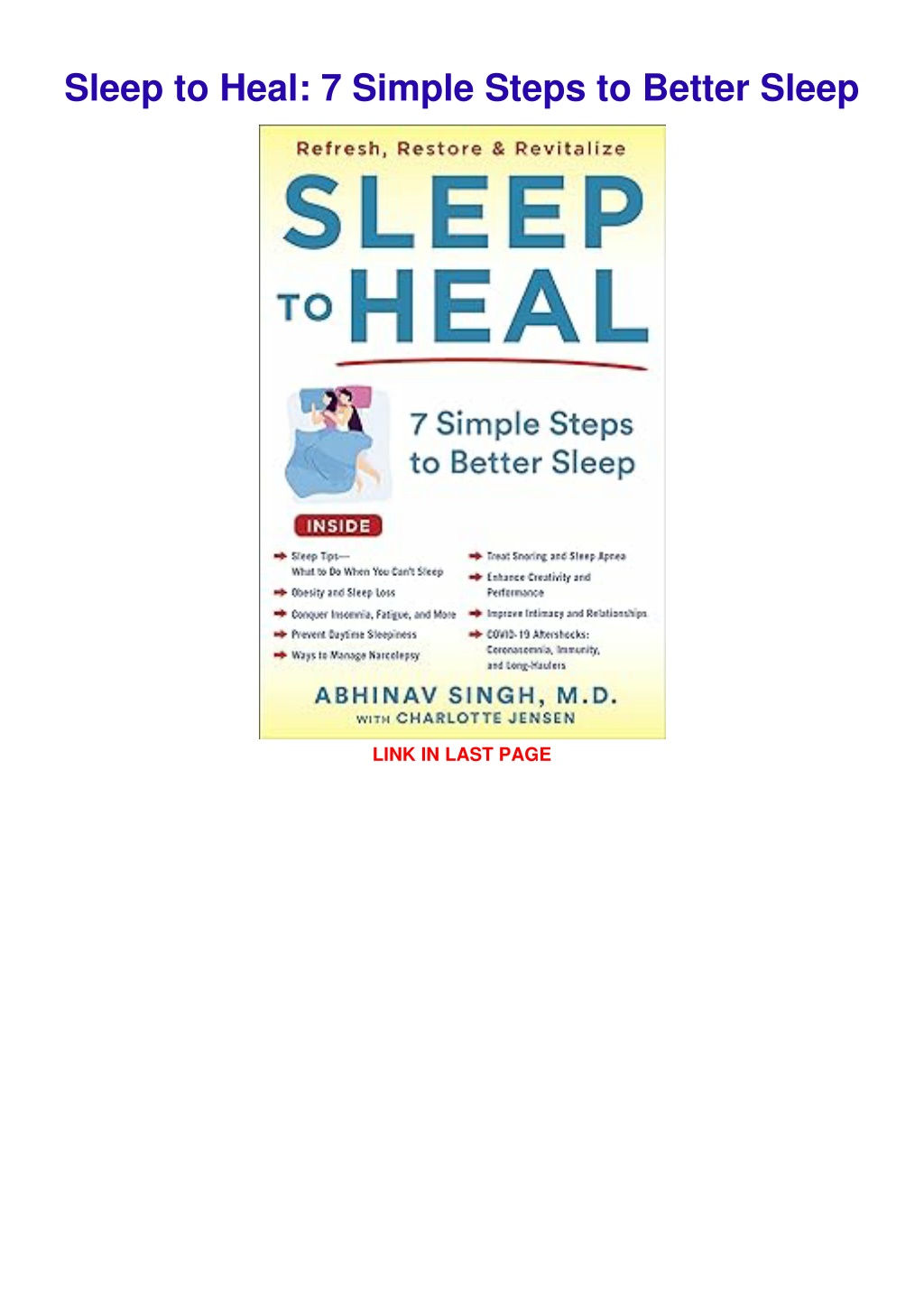Unlocking Deep Sleep: 7 Simple Steps for a Restful Night

Unlocking the Sanctuary: 7 Simple Steps for a Deeply Restful Night
The hum of modern life often drowns out the silent, essential rhythm of our sleep. We chase productivity, juggle responsibilities, and sometimes, in the quiet hours, find ourselves adrift in a sea of wakefulness. But what if the key to a more vibrant, energized life lies not in doing more, but in resting more deeply?
Deep sleep, often referred to as slow-wave sleep, is the restorative powerhouse of our slumber. It’s where our bodies repair, our minds consolidate memories, and our immune systems fortify. Yet, for many, this vital stage remains elusive. This article is your compass, guiding you through seven simple, yet profound, steps to unlock the sanctuary of deep sleep and emerge from your bed feeling truly renewed.
Why Does Deep Sleep Matter So Much?
Before we embark on our journey, let’s understand the profound impact of deep sleep. It’s not just about feeling less groggy; it’s about nurturing our entire being.
| Benefit Category | Impact |
|---|---|
| Cognitive | Enhanced memory consolidation, improved focus |
| Physical | Muscle repair, tissue growth, immune boost |
| Emotional | Mood regulation, stress reduction |
| Metabolic | Hormone balance, energy restoration |
When we consistently fall short on deep sleep, the consequences can ripple through our waking hours, affecting our mood, cognitive function, and even our long-term health. It’s time to reclaim this vital restorative period.
Your 7-Step Blueprint to Deeper Slumber
Embarking on the path to deeper sleep is a journey, not a destination. Consistency and patience are your allies as you implement these transformative habits.
Step 1: Crafting Your Sleep Sanctuary: The Haven of Tranquility
Your bedroom should be a sanctuary, a dedicated space where the world outside fades away. This means optimizing your environment for sleep.
- Embrace the Dark: Even small amounts of light can disrupt melatonin production, the hormone that signals sleep. Invest in blackout curtains or a comfortable eye mask to create an impenetrable darkness.
- Whispers of Cool: A slightly cooler room temperature is often conducive to deeper sleep. Aim for a range between 60-67°F (15-19°C).
- Silence the Noise: White noise machines, earplugs, or even a fan can mask disruptive sounds, creating a consistent, soothing auditory backdrop.
- Comfort is King (or Queen): Ensure your mattress and pillows support your body comfortably, allowing for effortless relaxation.
Step 2: The Evening Unwind: A Gentle Descent into Rest
The transition from your busy day to a restful night should be a gradual, mindful process. Avoid activities that stimulate your mind or body too close to bedtime.
- Digital Detox: The blue light emitted from screens suppresses melatonin. Aim to power down all electronic devices at least an hour before bed.
- Mindful Rituals: Engage in calming activities like reading a physical book, taking a warm bath with Epsom salts, or gentle stretching. These signal to your brain that it’s time to slow down.
- Sip Wisely: Avoid caffeine and alcohol in the hours leading up to sleep. While alcohol might initially make you drowsy, it disrupts sleep later in the night.
Step 3: The Power of the Body Clock: Aligning with Circadian Rhythms
Our internal body clock, or circadian rhythm, dictates our sleep-wake cycles. Honoring this natural rhythm is paramount.
- Consistent Wake-Up: Even on weekends, try to wake up around the same time each day. This helps regulate your body’s natural sleep-wake cues.
- Sunlight Exposure: Natural light, especially in the morning, helps to reset your circadian rhythm. Make an effort to get some sunlight shortly after waking up.
Step 4: Fueling for Sleep: Nutrition’s Subtle Influence
What you eat and when you eat can significantly impact your sleep quality.
- Light Evening Meals: Avoid heavy, fatty, or spicy meals close to bedtime, as they can cause indigestion and discomfort.
- Strategic Snacks: If you’re hungry, opt for a light snack containing tryptophan (like a small banana or a few almonds) which can aid in sleep.
- Hydration Harmony: Stay hydrated throughout the day, but limit fluid intake in the hour or two before bed to minimize nighttime bathroom trips.
Step 5: Movement for Serenity: Exercise’s Dual Role
Regular physical activity can be a powerful sleep aid, but timing is key.
- Morning or Afternoon Workouts: Exercising earlier in the day can improve sleep quality.
- Avoid Intense Evening Exercise: Strenuous activity too close to bedtime can elevate your heart rate and body temperature, making it harder to fall asleep.
Step 6: Taming the Mental Storm: Stress Management Techniques
A racing mind is often the greatest thief of deep sleep. Learning to quiet your thoughts is a crucial skill.
- Journaling: Before bed, jot down any worries or tasks that are occupying your mind. This can help externalize them and release their hold.
- Meditation and Deep Breathing: Simple mindfulness exercises or guided meditations can calm the nervous system and promote relaxation.
- Worry Time: Designate a specific time earlier in the day to address worries, so they don’t intrude on your sleep.
Step 7: The Power of Patience and Consistency: Nurturing Your Sleep Habits
Transforming your sleep is an ongoing process that requires dedication.
- Listen to Your Body: Pay attention to what works for you and be willing to adjust your approach.
- Don’t Strive for Perfection: It’s okay to have an occasional off night. Focus on the overall pattern of your sleep habits.
- Seek Professional Guidance: If you consistently struggle with sleep, consult a healthcare professional or a sleep specialist. They can help identify underlying issues and provide personalized strategies.
By weaving these seven simple steps into the fabric of your daily life, you can begin to unlock the sanctuary of deep sleep. It’s a journey of self-care, a commitment to your well-being, and a promise of more vibrant, energized tomorrows. Sweet dreams await.

Additional Information
Unlocking Deep Sleep: 7 Simple Steps for a Truly Restful Night
Millions struggle with insufficient rest, finding themselves tossed and turned, unable to achieve the deep, restorative slumber their bodies and minds crave. This lack of quality sleep doesn’t just leave you feeling groggy; it significantly impacts your mood, memory, overall health, and even life expectancy. The good news is that unlocking the power of deep sleep isn’t an impossible feat. It’s a journey that requires patience and consistency, but by implementing a few simple, science-backed strategies, you can elevate your rest and wake up feeling refreshed and energized.
What is Deep Sleep and Why Does it Matter?
Deep sleep, also known as slow-wave sleep (SWS), is a crucial stage of the sleep cycle. It’s characterized by slower brain waves, reduced muscle activity, and minimal eye movement. During deep sleep, your body works its magic:
- Physical Restoration: Tissues are repaired, muscles are rebuilt, and growth hormone is released, essential for physical recovery.
- Immune System Boost: Your immune system is strengthened, helping you fight off illness.
- Memory Consolidation: Information learned during the day is processed and stored, improving memory and learning.
- Energy Restoration: Your body replenishes its energy reserves, preparing you for the day ahead.
While we cycle through different sleep stages throughout the night, including light sleep and REM sleep, deep sleep is particularly vital for feeling truly rested and functioning optimally.
Are You Getting Enough Deep Sleep?
Recognizing if you’re not getting enough deep sleep can be as simple as paying attention to how you feel. Persistent daytime fatigue, difficulty concentrating, irritability, and a general lack of energy are strong indicators. While a sleep study is the definitive way to measure sleep stages, these common signs suggest your sleep quality might be compromised.
7 Simple Steps to Unlock Your Deepest Sleep:
Here are seven proven techniques, drawing on scientific insights, to help you enhance your deep sleep and achieve the restful nights you deserve:
1. Optimize Your Sleep Sanctuary: Create the Perfect Environment
Your bedroom should be a haven for sleep, a place where your body signals it’s time to wind down. This means controlling the key elements:
- Darkness is Key: Even small amounts of light can disrupt melatonin production, the hormone that regulates sleep. Invest in blackout curtains, an eye mask, and remove any electronic devices with glowing lights.
- Cool Temperatures: The ideal sleep temperature is generally between 60-67°F (15-19°C). A cooler environment promotes vasodilation, allowing your body to lower its core temperature, which is a signal for sleep.
- Quiet Zone: Minimize noise pollution. Consider earplugs, a white noise machine, or a fan to create a consistent, soothing soundscape that masks disruptive noises.
- Comfortable Mattress and Pillows: Ensure your bedding supports proper spinal alignment and is comfortable for your sleeping position.
Analysis: This step focuses on establishing an external environment conducive to sleep. By creating a dark, cool, and quiet space, you’re minimizing external stimuli that can keep your brain alert and promoting the physiological changes necessary for sleep onset and maintenance.
2. Master Your Pre-Sleep Routine: The Art of Winding Down
Your brain needs time to transition from the activity of the day to a state of rest. A consistent pre-sleep routine acts as a gentle signal to your body that it’s time to prepare for sleep.
- Digital Detox: The blue light emitted from screens (phones, tablets, computers, TVs) suppresses melatonin. Aim to put away all screens at least an hour before bed.
- Relaxing Activities: Engage in calming activities like reading a physical book, taking a warm bath, listening to gentle music, or practicing light stretching or yoga.
- Journaling: If your mind races with thoughts, journaling can help you externalize worries and clear your head before sleep.
- Herbal Teas: Consider caffeine-free herbal teas like chamomile or valerian root, known for their calming properties.
Analysis: This step addresses the internal preparation for sleep. By establishing a relaxing routine, you’re actively counteracting the stimulating effects of daily life and signaling to your nervous system that it’s time to slow down, making it easier to drift into deeper sleep.
3. Be Mindful of Your Diet and Hydration: Fueling for Sleep
What you consume, and when, can significantly impact your sleep quality.
- Limit Caffeine and Alcohol: Avoid caffeine in the afternoon and evening, as its stimulant effects can linger for hours. While alcohol might initially make you feel drowsy, it disrupts sleep architecture later in the night, reducing deep sleep.
- Avoid Heavy Meals Before Bed: Eating a large meal close to bedtime can lead to indigestion and discomfort, making it harder to fall asleep. If you’re hungry, opt for a light, easily digestible snack.
- Stay Hydrated, But Not Excessively: Ensure you’re adequately hydrated throughout the day, but avoid drinking large amounts of fluids right before bed to minimize nighttime awakenings for bathroom trips.
Analysis: This step highlights the physiological impact of food and drink on sleep. By making conscious choices about consumption, you’re preventing bodily discomfort and the disruption of natural sleep cycles caused by stimulants or digestive processes.
4. Prioritize Physical Activity (But Time it Wisely)
Regular physical exercise is a powerful tool for improving sleep quality. However, the timing of your workouts matters.
- Consistent Exercise: Aim for at least 30 minutes of moderate-intensity exercise most days of the week.
- Avoid Intense Workouts Close to Bedtime: Vigorous exercise can elevate your heart rate and body temperature, making it harder to fall asleep. Try to finish intense workouts at least 2-3 hours before bedtime.
- Gentle Movement: Light activities like walking or gentle yoga in the evening can be beneficial.
Analysis: Exercise contributes to the “sleep drive” – the longer you’re awake, the stronger the urge to sleep. Regular physical activity helps consolidate this drive, leading to deeper and more restorative sleep. However, the timing is crucial to avoid overstimulation.
5. Manage Stress and Anxiety: Calming the Racing Mind
Stress and anxiety are notorious sleep saboteurs, keeping your mind active and preventing relaxation.
- Mindfulness and Meditation: Practicing mindfulness or meditation can help you become more aware of your thoughts without judgment, reducing rumination.
- Deep Breathing Exercises: Simple deep breathing techniques can activate your parasympathetic nervous system, promoting relaxation.
- Cognitive Behavioral Therapy for Insomnia (CBT-I): If stress and anxiety are chronic issues impacting your sleep, CBT-I is a highly effective, evidence-based therapy that addresses the thoughts and behaviors contributing to insomnia.
Analysis: This step directly targets the psychological barriers to sleep. By equipping yourself with stress-management tools, you’re reducing the mental chatter that often keeps people awake, allowing for easier entry into deeper sleep stages.
6. Expose Yourself to Natural Light: Regulating Your Circadian Rhythm
Your body’s internal clock, the circadian rhythm, is heavily influenced by light exposure.
- Morning Sunlight: Expose yourself to bright natural light shortly after waking up. This signals to your brain that it’s daytime, helping to regulate your sleep-wake cycle.
- Daytime Light Exposure: Spend time outdoors during the day, even on cloudy days.
- Dim Lights in the Evening: As the day progresses, dim indoor lights to reinforce the signal for sleep.
Analysis: Light is the primary zeitgeber (time-giver) for our circadian rhythm. By strategically exposing yourself to light at the right times, you’re reinforcing the natural cues that tell your body when to be awake and when to be asleep, optimizing the timing of your deep sleep.
7. Consistency is Key: Nurture a Regular Sleep Schedule
Perhaps the most fundamental yet often overlooked step is maintaining a consistent sleep schedule, even on weekends.
- Go to Bed and Wake Up Around the Same Time: Aim for a consistent bedtime and wake-up time, even if you have less-than-ideal sleep on a particular night.
- Avoid Oversleeping: While tempting after a poor night’s sleep, oversleeping can disrupt your circadian rhythm further, making it harder to fall asleep the following night.
Analysis: This step is about training your body’s internal clock. By providing a predictable sleep-wake cycle, you reinforce your circadian rhythm, making it easier for your body to anticipate sleep and enter deeper sleep stages consistently.
When to Seek Professional Help
While these steps can significantly improve deep sleep, some sleep problems may require professional attention. If you consistently struggle with falling asleep, staying asleep, excessive daytime sleepiness, or suspect you have a sleep disorder like sleep apnea or restless legs syndrome, it’s crucial to talk to a doctor. They can help diagnose the underlying cause and recommend appropriate treatment.
Unlocking deep sleep is an investment in your overall health and well-being. By consistently applying these simple, science-backed strategies, you can pave the way for more restful nights and more energized days.
